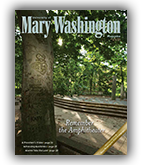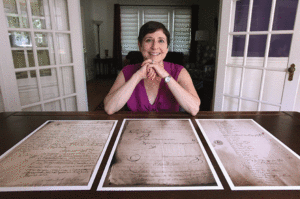Though they lived more than two centuries ago, the people Allyson Poska calls “my peasants” experienced day-to-day drama that rivals any TV reality show. The UMW professor of history spins juicy tales of intemperance, extramarital liaisons, and murders, naming names and making connections. The Shirley Van Epps Waple Professor has made their business her business: enriching the historical record.
“I study ordinary people,” Poska said of her career and of her latest research on the lives of Spanish peasant women who were brought to colonize the Argentine region of Patagonia in the 1780s. “In my profession, that’s really different.”
Poska has spent hundreds of hours in archives in South America and Spain, poring over manuscripts in early modern Spanish. Deciphering letters, court papers, and other documents, the UMW Waple professor mines the intimate details of lives uprooted by the Spanish government to populate an area coveted by England. The resulting book, the working title of which is Gendered Crossings, will shed light on the lives of women as they moved around the Spanish empire. The University of New Mexico Press expects to publish the book in 2016.
“I study ordinary people. In my profession, that’s really different.” – Allyson Poska
Gendered Crossings follows Poska’s critically acclaimed Women and Authority in Early Modern Spain: The Peasants of Galicia, published by Oxford University Press. In it, Poska told the stories of peasant women whose men had migrated. She explored how the men’s absence changed the social dynamic and gave the women surprising social and economic authority.
It was awarded the prestigious Roland H. Bainton Prize for the best book in history or theology for the quality and originality of Poska’s research, her methodological skill and innovation, her fresh interpretations, and the quality of her writing.
“I love the drama of regular people,” Poska said. “It’s so much a part of who I am.”

